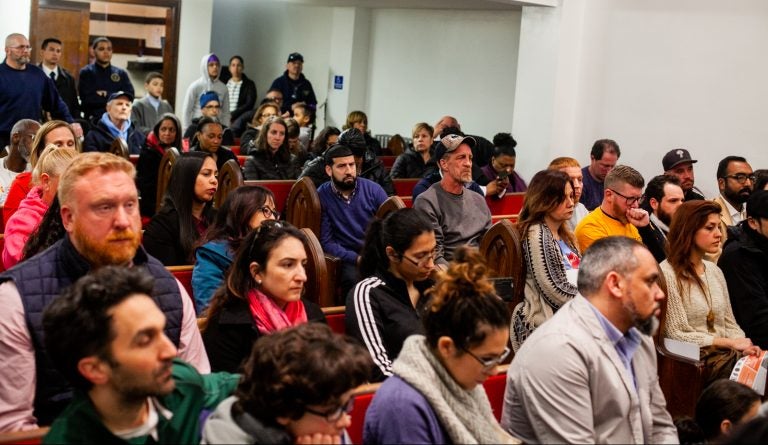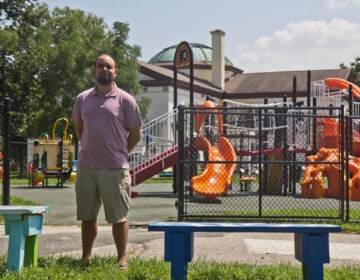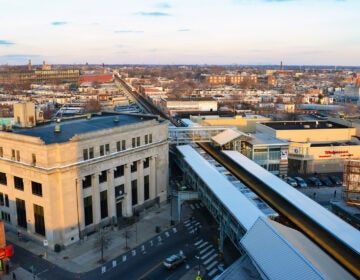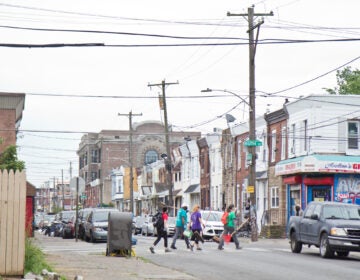As debate rages over a supervised injection site, some ask, ‘Do public meetings empower privilege?’
A plan to open a supervised injection site in Philadelphia has ignited a debate about the role of public engagement in local decision-making.

Philadelphia residents from Kensington and beyond attended a community forum in April 2019 discussing about a proposed supervised injection site. (Brad Larrison for WHYY)
Philadelphia City Council stood united last Thursday in their belief that Safehouse — the non-profit planning to open a supervised injection site — had committed an egregious violation of local democratic norms.
The problem, according to the five councilmembers who speechified against the group’s decision to open a site in South Philadelphia, was inadequate public engagement.
How could this policy decision be legitimate if there were no public meetings?
“The process is as important as the program,” Councilmember Curtis Jones said in a speech on the council floor. “You would be surprised how liberal some people can be, but you have to give them a choice. You can’t impose on them.”
Jones’s comments were echoed across the Philadelphia political spectrum. The decision to open a supervised injection site in a South Broad Street building prompted outrage from local Councilmembers Mark Squilla, a usually placid politician who broke character by angrily interrupting Safehouse’s Wednesday presser, and Kenyatta Johnson, whose district the site actually falls within.
Previously, it had been believed that the first of these controversial centers, where drug users can take a substance under medical supervision, would open in Kensington, the neighborhood at the heart of the city’s opioid crisis. But after receiving permission to open from a federal judge, Safehouse quickly announced that they would instead be opening the first site in South Philadelphia’s Constitution Health Plaza medical center.
Because the center is already zoned for medical use, no zoning relief was required to open the injection site. If a project requires zoning board approval, a community meeting requirement is triggered, giving neighborhood groups and the district councilmember an opportunity to exert influence over the project.
Although the supervised injection site did not need a variance and was thus not mandated to hold a neighborhood meeting in advance of opening, local politicians argued that the same template should be followed regardless of what was legally required.
“The most insulting part about this whole process is the lack of community input,” Johnson said.
“As district councilmembers, most of the time, if there’s a major project such as this that’s going to happen, we usually have the opportunity through the zoning process to make sure our voices are heard.”
But supporters of Safehouse countered that they knew exactly how such a public meeting would go down. They argue that such events tend to be dominated by the loudest, most oppositional voices even if all that is being discussed is a new bike lane. A supervised injection site would result in a volcanic backlash, with little chance for real or meaningful debate.
The city wouldn’t require public meetings about the location of a new public health center — except in areas where councilmembers have forced such obligations — or give residents a say in recycling policy. Why should the Safehouse project be treated differently? Should the prejudices and parochial concerns of nearby neighbors outweigh the public need for uses like a domestic violence shelter, a methadone clinic, or a safe injection site?
“I just think that when the city has the authority to do something like this, it should utilize that authority,” said James Gitto, president of the West Passyunk Neighbors Association. “If all the data suggests that this would have a positive impact on public health, then that should be the first priority. Not everything needs to be a consensus.”
Gitto isn’t alone. The value of community meetings as a mode of meaningful public engagement is a presumption coming under increasing scrutiny.
A recent study by a trio of Boston University academics analyzed years of zoning and planning meetings in 97 cities and towns in eastern Massachusetts. A quirk of the state’s sunshine laws requires that community meeting participants list their name and address, which the researchers cross-referenced with other publicly-available administrative data to produce a detailed demographic analysis.
The Boston University academics found that neighborhood meeting participants are deeply unrepresentative of their communities. They are more likely to be white than the average resident, and they are much older and far more likely to be homeowners.
“There are really big disparities, bigger even than disparities between voters and non-voters,” said Katherine Levine Einstein, assistant professor of political science at Boston University and one of the co-authors of Neighborhood Defenders. “These disparities persist whether you’re looking at affluent towns or really disadvantaged places.”
Community meeting attendees were also overwhelmingly opposed to development of any kind, with 62% of attendees speaking against the projects they were presented. Only 15% spoke in favor.
Einstein said the problem with this form of hyper-local public engagement is that it privileges concentrated costs over more diffuse benefits. A new protected bike lane would keep riders from all over the city safe, but the people who actually attend a meeting about its creation are typically the handful of neighbors who may soon have a harder time parking in front of their homes.
“We might think about neighborhood meetings as being this great way to empower underrepresented voices,” Einstein said. “But our research shows that it is really more of a forum for empowering, typically, the most privileged segments who are often disproportionately opposed to the thing that’s getting proposed.”
But if Safehouse sought to avoid the pitfalls of public meetings, it did their mission little good.
Within 36 hours of announcing their South Philadelphia supervised injection site, the plan was unceremoniously put on hold in the face of public and political backlash.
“We have to be careful to not overemphasize the role of public meetings in a decision-making process, but when an issue is really controversial it needs deeper public engagement,” said Andrew Stober, a former municipal official under Mayor Michael Nutter. “The voices of hundreds of people who live just blocks away who are supportive of this site opening weren’t heard either, because there wasn’t a deeper level of public engagement.”
When Stober ran the Mayor’s Office of Transportation and Utilities, his office attempted to meet people where they were by canvassing residents for their views outside public transit stops and grocery stores, in libraries and recreation centers.
Setting up a booth with literature and trained staff to answer questions in locations where people were going in their own time ensured that a larger swathe of the population could have their perspective heard. Then the self-selecting voices heard at public meetings could at least be matched with broader feedback.
Boston University’s Einstein agrees that more proactive forms of public engagement are preferable to the kind of public meetings triggered by Philadelphia’s zoning process (and now expected as a matter of course). She points to Minneapolis, where the city-wide legalization of triplexes was preceded by deep community engagement where residents’ views were solicited at street festivals and farmers markets, not just neighborhood meetings. As a result, renters’ voices were heard more often, not just the homeowners who dominate community associations.
Some supporters and even opponents of Safehouse, however, say that the uproar over the unveiling of the South Philadelphia site were largely just about broader objections to the very idea of a supervised injection site.
“It was infuriating, but I don’t care what procedures they do to pass it or if they give us due process,” said South Philadelphia resident Donna Ciafre. “It doesn’t matter, I don’t want it period. I don’t want it in Philadelphia, I don’t want it in New Jersey, I don’t want it in the United States.”
WHYY is your source for fact-based, in-depth journalism and information. As a nonprofit organization, we rely on financial support from readers like you. Please give today.







